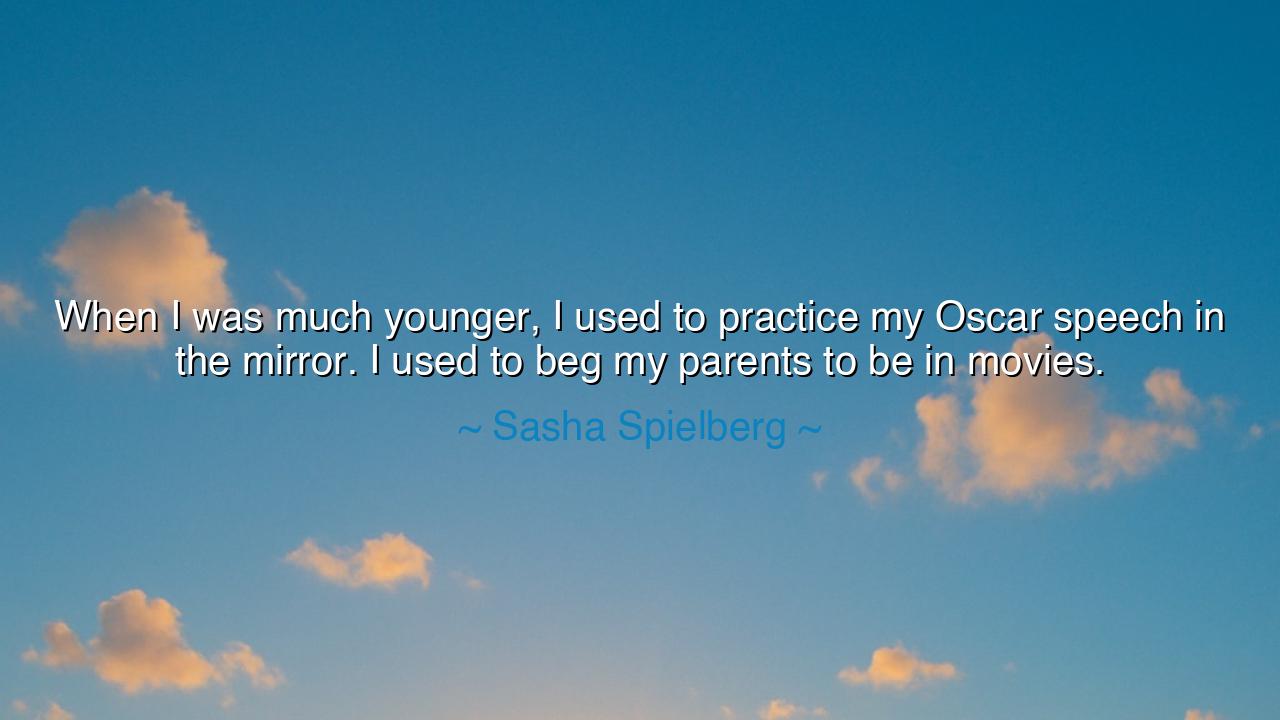
When I was much younger, I used to practice my Oscar speech in
When I was much younger, I used to practice my Oscar speech in the mirror. I used to beg my parents to be in movies.






Sasha Spielberg’s words, “When I was much younger, I used to practice my Oscar speech in the mirror. I used to beg my parents to be in movies,” reflect the dreams of a young soul, eager to step into the world and create something meaningful. In this simple yet powerful statement, Spielberg reveals the innate yearning that all humans feel when they are young—the desire to be seen, to achieve, and to make their mark on the world. Practicing an Oscar speech in the mirror is not just a playful exercise; it is a symbol of ambition, of the dreams that stir within us when we are still untouched by the harshness of reality. It speaks to the visionary spirit that exists in the hearts of those who have yet to encounter the limitations of life, and yet, the beauty of these early dreams lies in their purity and passion.
In ancient cultures, dreams of greatness were often the seeds from which heroes and leaders were born. Consider the story of Alexander the Great, who, as a child, was taught by the philosopher Aristotle, not only in the art of war but in the virtues of leadership and ambition. It is said that Alexander would often gaze into the distance, imagining the vast empire he would one day conquer. His dreams, much like Spielberg’s early reflections, were not bound by what was immediately possible, but by the great heights he imagined reaching. His vision of greatness, practiced in his mind and soul, ultimately became his legacy. In the same way, Spielberg’s practice of speaking her dreams aloud, even in the mirror, was a ritual of becoming, of setting her sights on a future she knew she could one day claim.
What Sasha Spielberg reveals is the transformative power of youthful dreams. In the act of visualizing success, of speaking her Oscar speech into existence, she was not just playing a game; she was tuning her mind to the vibration of what she wanted to achieve. This is not a mere whim, but a form of intentionality—a way of aligning oneself with the universe’s greater forces, much like the ancient philosophers who believed in the power of the mind to shape the world. Plato spoke of the importance of vision in achieving great deeds, suggesting that a mind aligned with purpose and intention can shape the world around it. In the same way, Spielberg’s early rehearsals were a manifestation of intent, an alignment of thought, spirit, and action towards the goal of success in the world of film.
The importance of this early practice, of envisioning success before it even happens, can also be found in the story of Michelangelo, the great sculptor and painter. It is said that Michelangelo could see the finished masterpiece within the block of marble before he ever touched it with his chisel. He didn’t just create art; he revealed it, as if it was already there, waiting to be brought forth. His vision of what was possible guided his hands, and his ability to see the end result before it came to life made him one of the greatest artists in history. Similarly, Spielberg’s early imagining of her success was a way of seeing the future before it had unfolded—a way of aligning her will with the greatness she wished to manifest.
In this act of envisioning, of speaking aloud what one desires, there is also a sense of courage. To dream of winning an Oscar is to stand against the fear of failure, to look at the vast ocean of possibilities and believe in your ability to navigate it. The courage to ask her parents to be in movies is a recognition of the will to engage with the world, to not just wait for the opportunity to come but to seek it out, to demand it, much as Odysseus demanded that the gods allow him to return home after his long journey. Spielberg’s unwavering desire to step into the world of film was a call to action, a demand to shape her destiny rather than be a passive observer.
This is the true lesson in Spielberg’s words: do not fear the power of your dreams, even if they seem far-fetched or impossible. Like the ancient heroes, your dreams are the seeds of your future. They are not merely fantasies but blueprints of what you can achieve when you align your mind, heart, and will. Take the time to visualize your goals, to speak them aloud, to embody them in your very actions. Like Alexander or Michelangelo, see the greatness within you before the world can. Understand that the journey to success often begins not with external achievements but with the courage to dream and the clarity of vision to make those dreams come true.
As you move forward in your own life, take a moment to practice your own “Oscar speech” in the mirror. See the life you want to create, feel the emotions of that success, and speak it into existence. In doing so, you will not only bring your dreams closer to reality, but you will empower yourself to take the actions necessary to bring those dreams to life. Embrace your vision, and know that the first step to greatness is often the belief that you are capable of achieving it.






AAdministratorAdministrator
Welcome, honored guests. Please leave a comment, we will respond soon